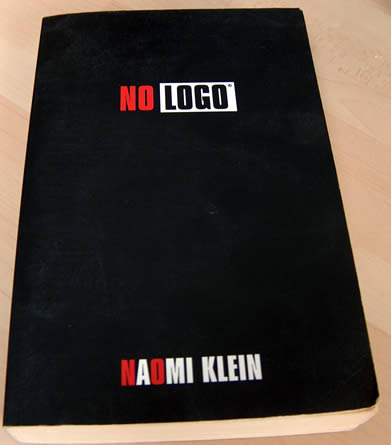|
The
danger
of fake wine
 Naomi
Kleinís No Logo is an important book, although I confess that
I didnít finish it. I got about two-thirds of the way through before
the repetition and heavy agenda put me off. But it is important,
despite what I felt to be its flaws, because it points out the
ugliness and soullessness of a world touched by Ďglobalizationí.
The dominance of big business results in a popular culture that is
uniform and sterile, with branded goods dominating, and a constant
push of relentless advertising invading our mental space. Our senses
are bombarded daily with commercial messages. Our participation in
society itself is, above all else, as consumers. Naomi
Kleinís No Logo is an important book, although I confess that
I didnít finish it. I got about two-thirds of the way through before
the repetition and heavy agenda put me off. But it is important,
despite what I felt to be its flaws, because it points out the
ugliness and soullessness of a world touched by Ďglobalizationí.
The dominance of big business results in a popular culture that is
uniform and sterile, with branded goods dominating, and a constant
push of relentless advertising invading our mental space. Our senses
are bombarded daily with commercial messages. Our participation in
society itself is, above all else, as consumers.
While Klein does a great (and rather depressing job) of
pointing out what is wrong with our culture, her solutions are rather
fewer. The big danger is that if you start interfering with a faulty
system you can make it a whole lot worse: despite its flaws, the free
market has delivered us a society that is largely functional Ė at
least compared with societies based around planned economies, which
generally suck. Ideology is dangerous stuff when it isnít countered
by healthy pragmatism.
Still, this doesnít mean we canít gripe about what
is ugly in our society, and seek to change it. In my gripe, Iím
going to focus on the wine business, not because I think it is
especially important compared with issues such as health, poverty and
education, but simply because this is my corner of the world.
I find branded wines upsetting, largely. They are
dressed up to look like interesting wines; made to sound as if they
have been lovingly created from a single vineyard by artisanal
winemakers in small, rustic cellars Ė aged gracefully in oak barrels
with the attentive hand of the grower never far away.
The truth is they are industrial concoctions
manufactured in huge factory-like wineries from machine-picked grapes
that come from huge, flat, irrigated vineyards, and cooked up with all
manner of winemaking trickery. They are blended together to offend as
few consumers as possible (i.e. to taste as little of Ďwineí and
as much of fruit juice as possible), sometimes sweetened with a couple
of grams (or more) of residual sugar, and sold by deep discounting to
give the punter an impression of quality.
All very well, you argue, but the world needs good
cheap wine. I couldnít agree more. But why canít we have cheap
honest wine? Why does there have to be this binary choice between
cheap, branded, fake wine and expensive, authentic fine wine? [In
truth, there is now as much fake authentic fine wine as there is
honest stuff Ė the branders want to wean you from fake cheap wine to
their fake expensive wine.]
Is there actually such a thing as fake wine? I think
so. Itís wine that is made with the specific intention of being
something that it is not. It is like a person who puts on a front.
They may be very good at acting out their persona, but eventually the
lack of genuineness shows.
Cheap, honest wine still exists, and thanks to the
growing natural wine movement, looks like it will have a future.
Youíll have to search for it, though, because the modern retail
environment, with its demand for uniformity, continuity of stock, and
large volumes means that only the big players get invited to the
party. Honest, affordable wine is most commonly made by smaller
growers who canít deal with the quantities needed by major
retailers. Increasingly these producers are finding it hard to access
the marketplace.
The danger with fake wine is that it could kill the
whole wine category. If wine becomes just another manufactured
beverage, shorn of its interest and diversity, then whatís the
motivation for consumers to trade up? Will people ever think wine
appreciation is a worthy hobby if all they are weaned on is industrial
crap? Branded wine is like a movie set: looks great from the outside,
but pass behind the edifice and itís all plywood and 2 by 4s.
What can stem this rising tide of branded wine? I
reckon some gently subversive counter movement is needed. People need
to be champions of honest, natural wine. If thereís an increased
demand, then perhaps the continued existence of real wine will be
assured.
Back to top
|

